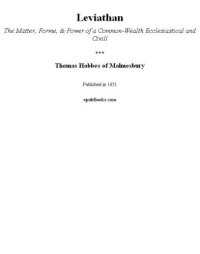
Ebook: Leviathan and the Air-Pump: Hobbes, Boyle, and the Experimental Life
Author: Shapin Steven, Schaffer Simon
- Year: 1985
- Publisher: Princeton University Press
- Language: English
- epub
In the aftermath of the English Civil War, as people were groping for new forms of political order, Robert Boyle built an air-pump to do experiments. Does the story of Roundheads and Restoration have something to do with the origins of experimental science? Schaffer and Shapin believed it does.
Focusing on the debates between Boyle and his archcritic Thomas Hobbes over the air-pump, the authors proposed that "solutions to the problem of knowledge are solutions to the problem of social order." Both Boyle and Hobbes were looking for ways of establishing knowledge that did not decay into ad hominem attacks and political division. Boyle proposed the experiment as cure. He argued that facts should be manufactured by machines like the air-pump so that gentlemen could witness the experiments and produce knowledge that everyone agreed on. Hobbes, by contrast, looked for natural law and viewed experiments as the artificial, unreliable products of an exclusive guild.
The new approaches taken in Leviathan and the Air-Pump have been enormously influential on historical studies of science. Shapin and Schaffer found a moment of scientific revolution and showed how key scientific givens--facts, interpretations, experiment, truth--were fundamental to a new political order. Shapin and Schaffer were also innovative in their ethnographic approach. Attempting to understand the work habits, rituals, and social structures of a remote, unfamiliar group, they argued that politics were tied up in what scientists did, rather than what they said.
Review
. . . Steven Shapin and Simon Schaffer have ventured beyond ordinary history of science or history of ideas to produce a novel 'exercise in the sociology of scientific knowledge.' . . . a historical study rich in new interpretations and notable for the use of sources of a kind not hitherto fully exploited by scholars. -- Clive Holmes, American Historical Review
Shapin and Schaffer work out the implications of these debates [between Hobbes and Boyle] for the history of science with great skill of interpretation and exposition. They use their findings and their analysis to give an explanation of the experimental enterprise in general, which, although it is not philosophical in nature, always takes philosophy most seriously. This is simply one of the most original, enjoyable and important books published in the history of science in recent years. -- Owen Hannaway, Technology and Culture
If any proof of the intellectual buoyancy or intrinsic worth of the history and philosophy for science was needed, nothing better could be provided than this study by Steven Shapin and Simon Schaffer. . . . Their findings suggest the futility of wrenching science from its ideological context, and not only with respect to the seventeenth century; they also detect parallels with the crisis of confidence affecting contemporary science. -- Charles Webster, The Times Literary Supplement
About the Author
Steven Shapin is the Franklin L. Ford Professor of the History of Science at Harvard University. Simon Schaffer is professor of history of science at the University of Cambridge.